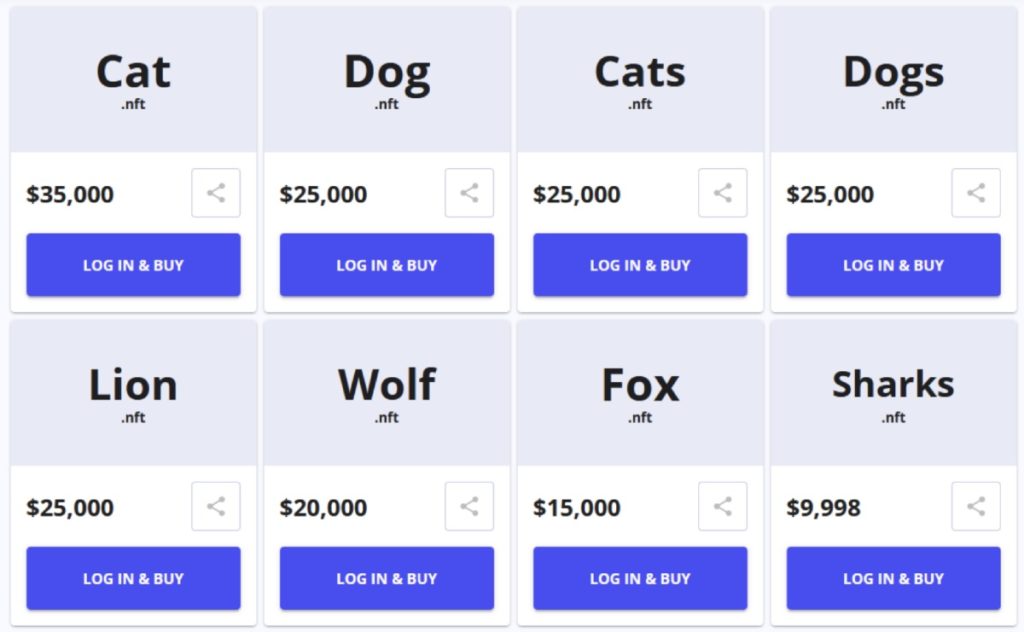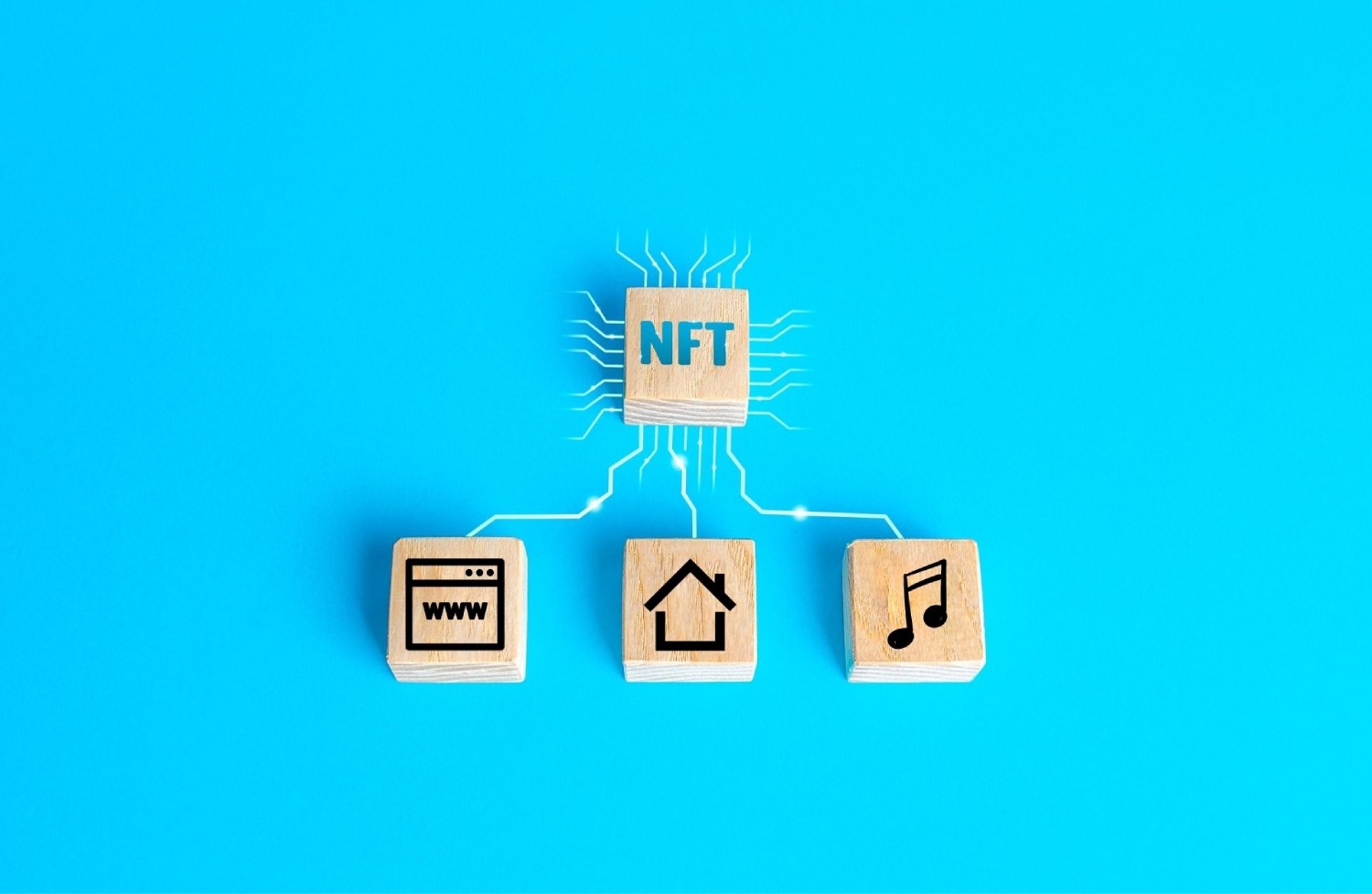NFTs got famous as a way to bring scarcity in the digital art world, giving artists a fair – sometimes more than fair – compensation for their work.
It’s useless to remind you of all the hype around NFTs and digital art, as it made the headlines of countless articles.
In this article, let’s forget about Beeple and CryptoPunks for a moment and focus on 7 other industries that NFTs could revolutionize.
NFTs in Fashion

The impact of counterfeits on the fashion industry is vast, and it’s growing every year, so we’re talking about a whole “counterfeiting industry” worth more than $4 trillion by the end of 2022. Did you know that 20% of the fashion products on social media are fake? The fashion industry has lost more than $50 billion in 2020 because of fakes.
NFTs can bring quite a change here.
Fashion retailers can implement a simple QR code on their price tags which users will scan. Through that scan, they can see all the details about the product, who is the creator, where it has been created etc.
What is more, NFTs can play a significant part in the whole fashion supply chain. All the parties engaged in the supply chain can verify where certain materials are coming from, who owns what cargo, etc.
Yes, it’s about clear ownership, transparency and, ultimately, responsibility for delivering a specific product.
Besides, the fashion industry, just like the NFT marketplace, is all about scarcity, exclusivity, “who’s got that limited-edition piece, that diamond watch or that rare purse”.
And that concept of exclusivity in the fashion world opens the doors to another concept: virtual fashion. Yes, it’s what you think it is, people can buy virtual fashion items.
The idea of spending money on digital clothes or products may seem crazy and absurd at first glance. However, the fashion world, and fashion as an art and way of expressing yourself, is no longer about “needing” another pair of shoes, is it? It’s about collecting, being part of a certain culture, and the story that a specific brand is building.
The Fabricant, for example, is a 100% digital fashion house, they don’t sell any physical pieces. But iconic fashion brands are also joining the “game”. A virtual Gucci bag sold for 350,000 Robux on Roblox. That’s more money than a real Gucci bag, if you want to know.
Fashion and NFTs do have a lot in common when it comes to these things. NFTs can open a new era of sales for fashion brands and revolutionize their interaction with customers.
NFTs in Music

Musicians can store their copyrights as NFTs. So, each time someone plays their music, they can receive payment automatically.
Do you know what would be even nicer? A whole NFT music industry where fans can support their favorite artists directly by buying NFTs, or specific collectibles and perks from their idols.
NFTs can give musicians more power and control over their art by offering them a decentralized marketplace. Kings of Leons, Steve Aoki, or Grimes have already made millions by selling NFTs.
How can NFTs help musicians?
Well, you see, Michael Jackson’s “Thriller” album released in November 1982 has sold over 66 million copies worldwide. It stayed there, at the top as one of the best-selling albums of all time ever since. But could you see anyone breaking that record in this digital era of music streaming?
No way…
This April, Paul McCartney and other 150-something musicians wrote an open letter for the UK Prime Minister stating that songwriters receive 50% of the radio revenues, but only 15% from streaming their music. That seems like a problem when you know how important the streaming industry is (Spotify alone has almost half a billion users).
So, if you can’t make much money from your music anymore, how can you make it?
One way would be to play out your cultural and brand capital, like Janet Jackson or the Rolling Stones. Some of their most ardent followers and fans would love a special trinket made just for them by the King of Pop’s sister.
Kings of Leon, for example, sold VIP tickets to their show as NFTs, along with a tokenized version of their latest album and a physical Vinyl. That is nice.
But NFTs are also a great way for fans to support less-famous artists. If you discover a small band before the rest of the world and believe it’s just a question of time until they become famous, would you not like to show them your support? I know I’d be happy to spend some money on their first album sold as an NFT if it gives me, let’s say, free seats to their concerts for life…
NFTs in Sports

Yes, NFTs are coming to sports.
There are already a lot of sports collectibles sold as NFTs and a lot of famous athletes have joined the hype. It seems like NBA players took the lead, making a fortune from that.
But NFTs in sports can go much further than digital collectibles!
What blocks the sports industry from moving one step closer to our daily lives and selling game tickets and other physical items as NFTs.
I mean, why not?
No more counterfeit tickets, no more counterfeit team jerseys – can you imagine a world like that?
Take game tickets, it is totally possible to imagine, because every ticket is basically the same, apart from a string of data that is unique for every owner (a serial number etc.) – that sounds like NFT business to us.
Real Estate

Believe it or not, there have already been a couple of NFT real estate sales. The first NFT house is called “the Mars House”, and it is completely digital. That didn’t stop a buyer from paying $500K for it. Although he or she can never step inside, they’ve got a futuristic Mars House design as an NFT now.
There are also NFT role-playing games like Superworld, where you can buy and sell virtual real estate.
However, can we set outside the virtual world and actually buy physical NFT real estate? It seems so.
In the future, we might be able to buy a building or the air rights of any physical space. That seems craaaazy. Nevertheless, venture capitalist Tim Draper thinks it can become a reality.
It will simplify things, actually.
Just think of it – buying a property is a laborious and time-consuming process. It requires a ton of paperwork. Why don’t we just tokenize the property papers and make the buying/selling as easy as saying, “I’m buying that one”. Just a few clicks and you’ve got it. It’s yours, right there, and the transaction is recorded on the blockchain. BAM!
Nevertheless, the real estate industry is a tad slow when it comes to anything new. Please don’t tell that to any real estate broker, but just imagine you don’t have to go through one. Just imagine the democratization of real estate.
NFTs can bring all that to the table…
Finance

There’s an interesting combination of gamification and decentralized finance (DeFi) here.
Through the JustLiquidity platform, for example, you can stake tokens in a pool for a specific period. As a result, you’ll receive an access NFT ticket. You can then use it to stake in another pool. And so on. You basically provide a liquidity pool for transactions and get paid in fees for that.
One other interesting example is BakerySwap – an NFT marketplace of sorts that works on the Binance Smart Chain (BSC). It is a combination of DeFi and NFTs, in the sense that you stake liquidity in exchange for BAKE – their native token. You can then use BAKE to buy NFTs. You can then exchange the NFTs for BAKE on the sample platform or trade them on other NFT marketplaces.
Licensing

Proving the authenticity of a legal document can be tricky, or at least time-consuming, as they are relatively easy to fake.
But consider this: University degrees and other types of course certificates can be turned into NFTs. This means they will be safely stored on the blockchain, and no one can deny their identity.
What is more, they can be easily scanned and verified without the need of making copies. All the parties involved will be sure about their authenticity, and the verification process is so much easier.
Domains and Addresses

Just four months ago, Unstoppable Domains – a company building blockchain domain names – sold the blockchain domain NFT name “win.crypto” for $100,000.
NFT domain names are almost like .com names for decentralized websites that have nothing to do with any centralized data hosting services.
For example, these decentralized domain names can replace the unreadable crypto wallet addresses with something…well, more humane, that is, less of a mouthful.
This way, you can own your crypto wallet and make it yours rather than identifying it with an inexplicable string of characters.
The Unstoppable Domains’ blockchain domain NFTs (yeah, quite a mouthful here) are sold via their own platform or even on OpenSea.
Why the hype?
Well, you can buy a typical “.com” domain for an average sum of $10, but that domain is not yours, meaning you cannot purchase the permanent ownership. Usually, you just “rent” it and have to renew it every year.
However, the NFT domain names you buy from Unstoppable Domains are yours forever, or until you decide to sell them to the highest bidder.
See, it’s the verifiable and undeniable total ownership of a physical or virtual object that makes NFTs so marvelous.
Unstoppable Domains usually release a batch of unique premium NFT domain names weekly. Here are some you can get at the time of writing these lines: .888 – .bitcoin – .coin – .crypto – .dao -.nft – .wallet
So, if you want to buy dog.crypto or Larry.nft, you’d better hurry up until they’re gone.
The wide scope of NFTs
By the look of it, NFTs are here to say. There’s much more to this technology than a bunch of extremely pricey artworks.
In reality, the extent of the scope of NFTs relies on the NFT token standards.
They all have boring and impossible-to-remember names, but they’re the reason behind all these NFT use cases presented above. So, we feel like you should at least know about the main ones before you go.
So, ERC721 is the initial NFT token standard built on Ethereum. Each token is unique; it cannot be duplicated or destroyed and can have a different value than the others.
ERC 1155 and ERC 998 are the other two non-fungible token standards that open the door for many more NFT use cases. ERC 1155 lets users register both fungible and non-fungible tokens on the same smart contract or address. So, in a game, you can have fungible tokens acting as currency and non-fungible tokens as exchangeable collectibles.
ERC 998 tokens allow for items to be composed into complex “packages” that can then be traded as part of a single transaction. So, yes, with the help of this standard, you can create a whole portfolio of items or even a virtual holding company. Just like ERC 1155, ERC 998 can also be both fungible and non-fungible.
So, yes, NFTs have a long and prosperous future outside of the art and gaming world. Are you in already?

